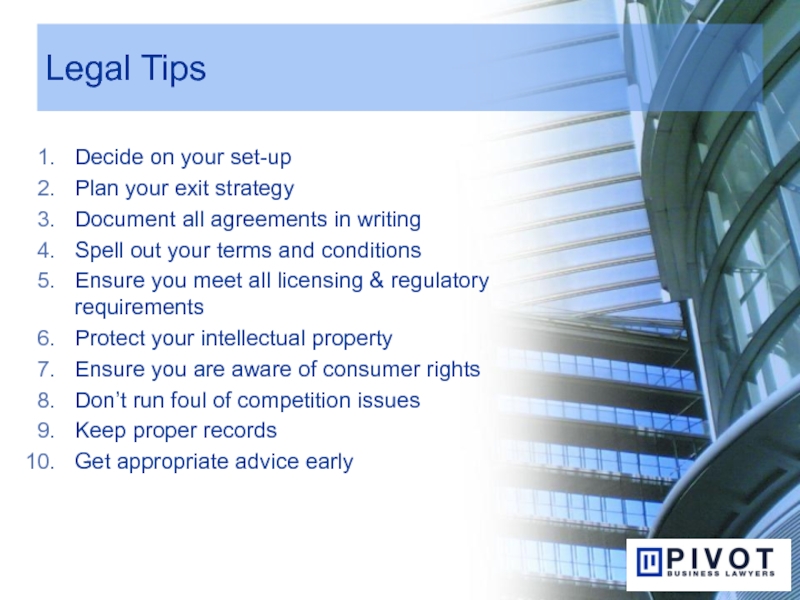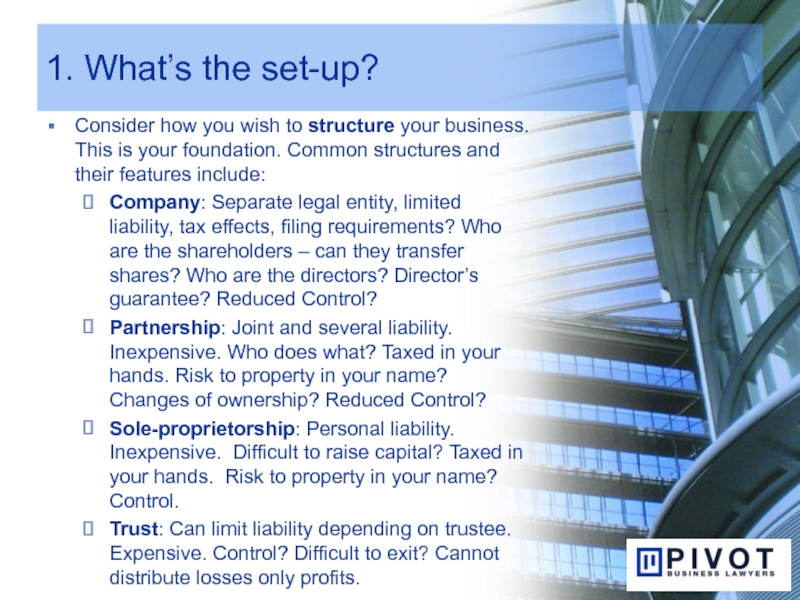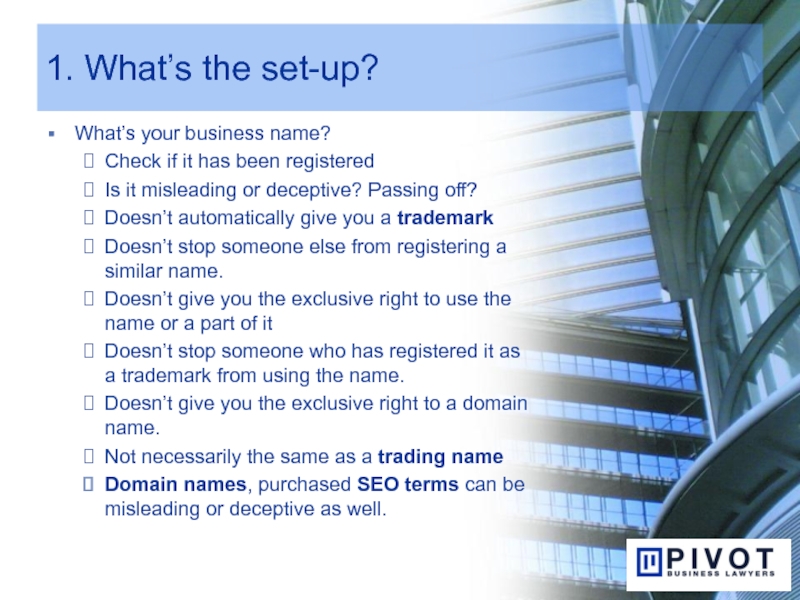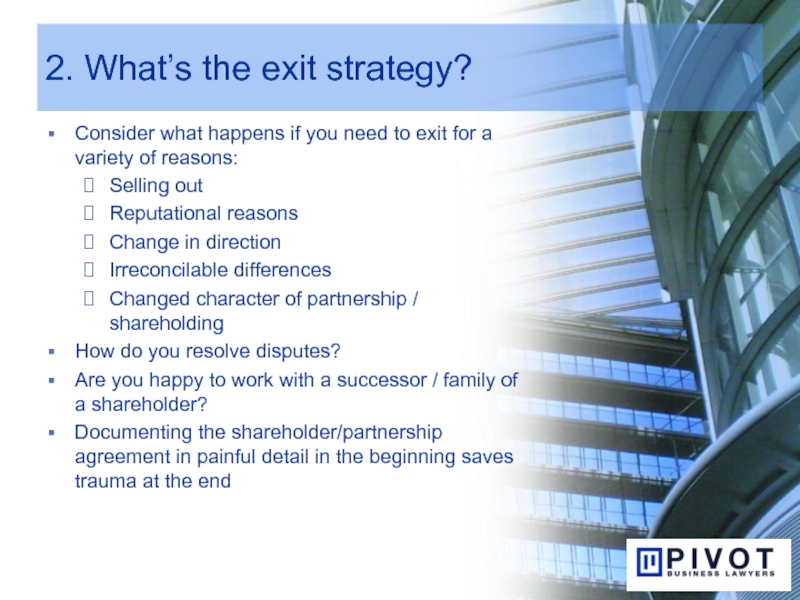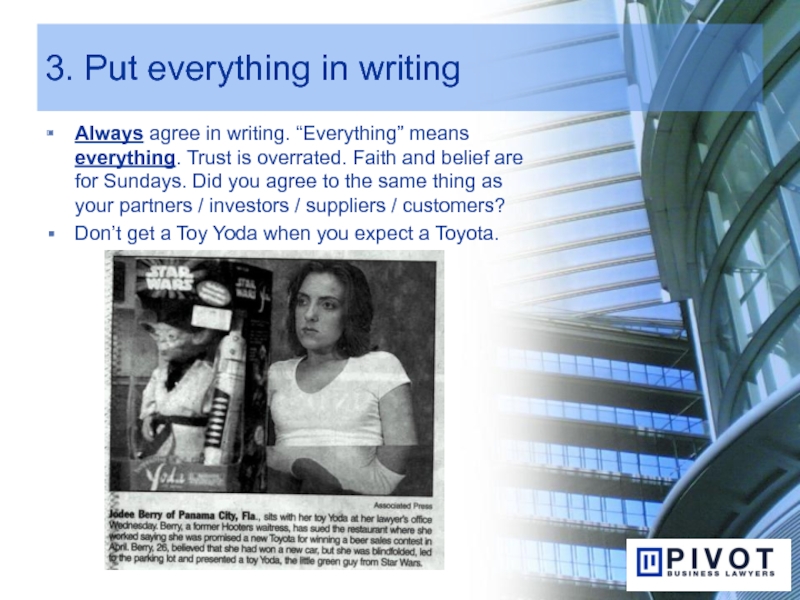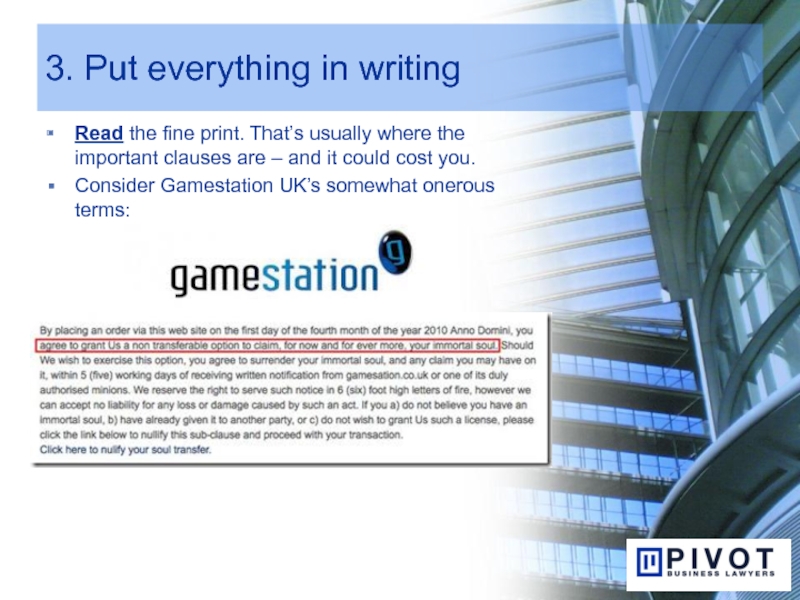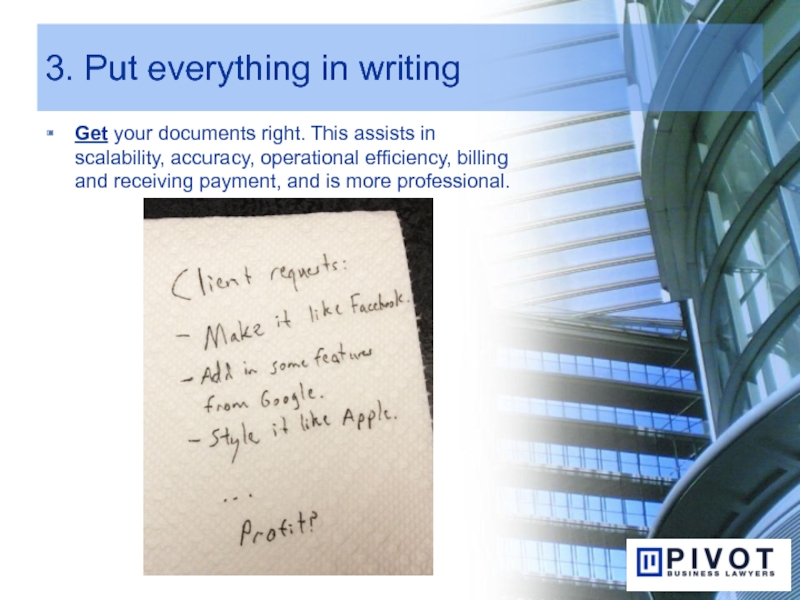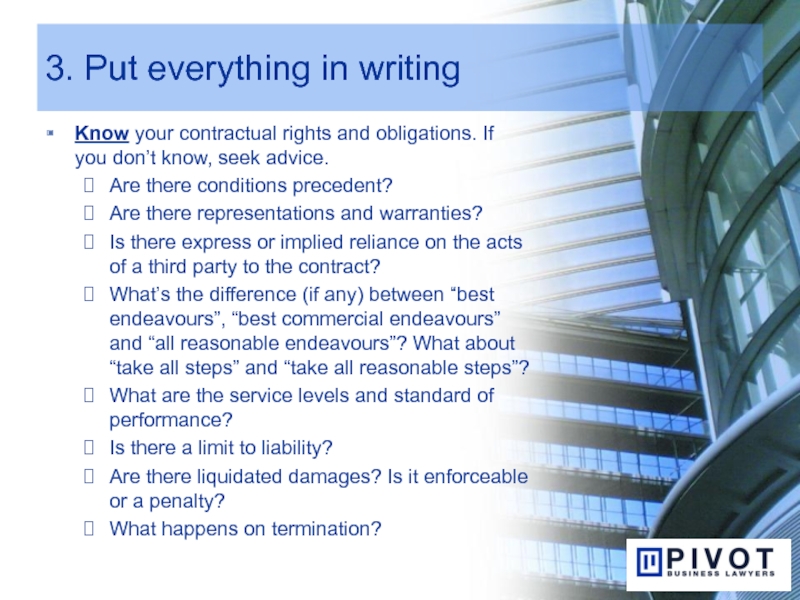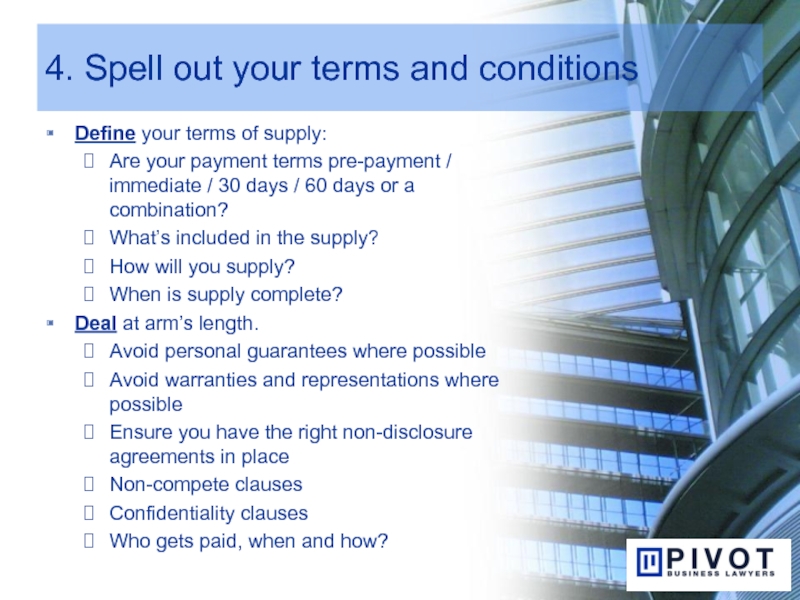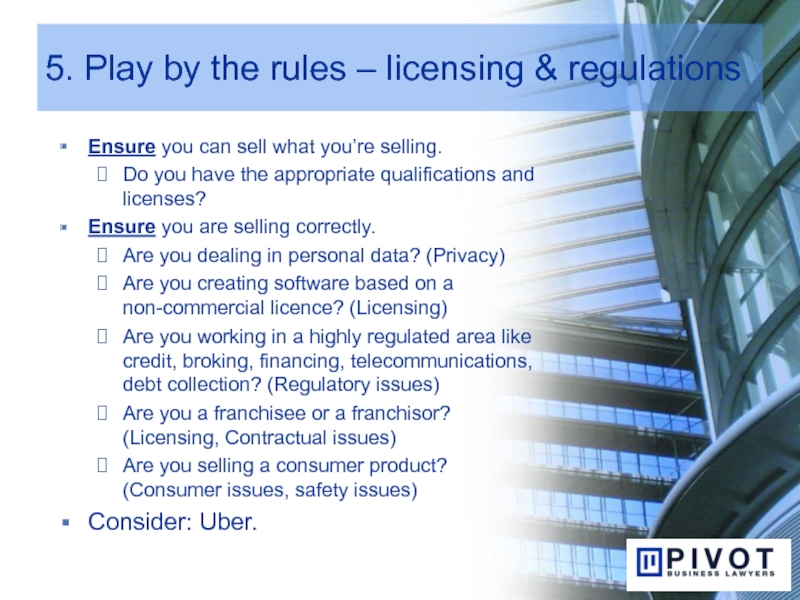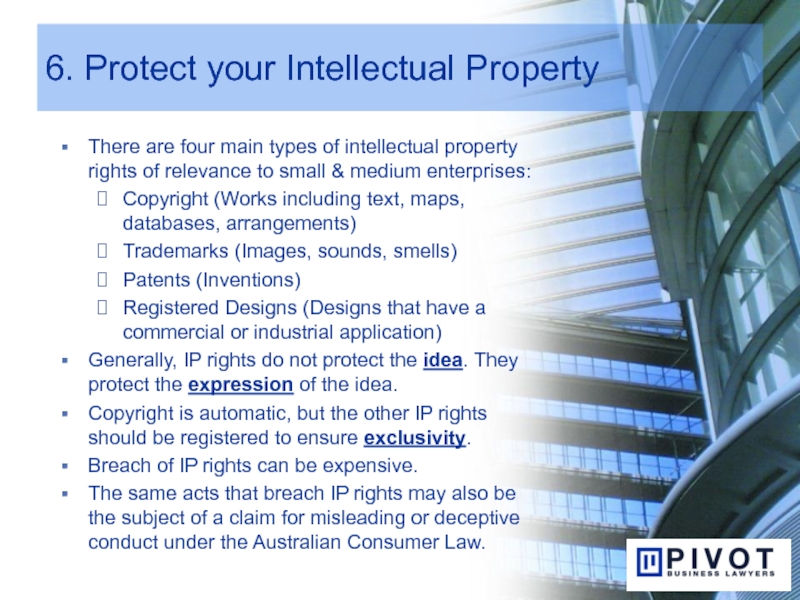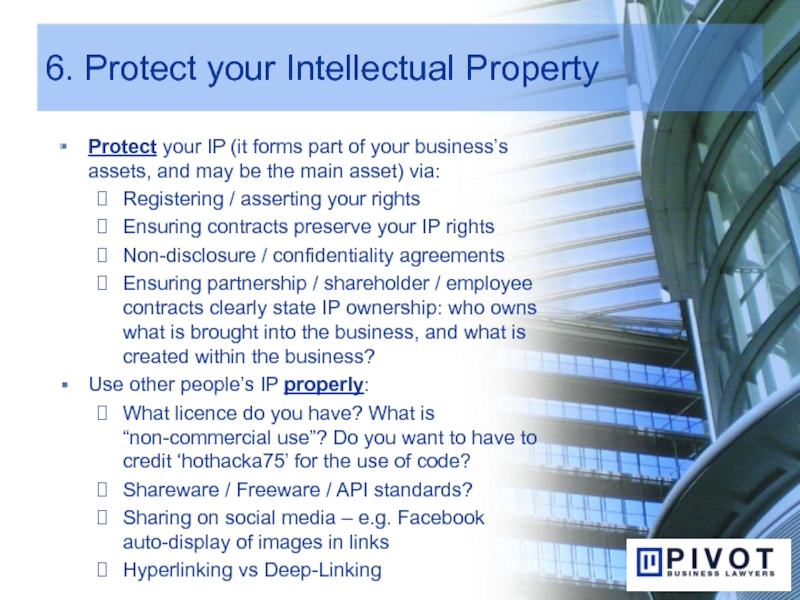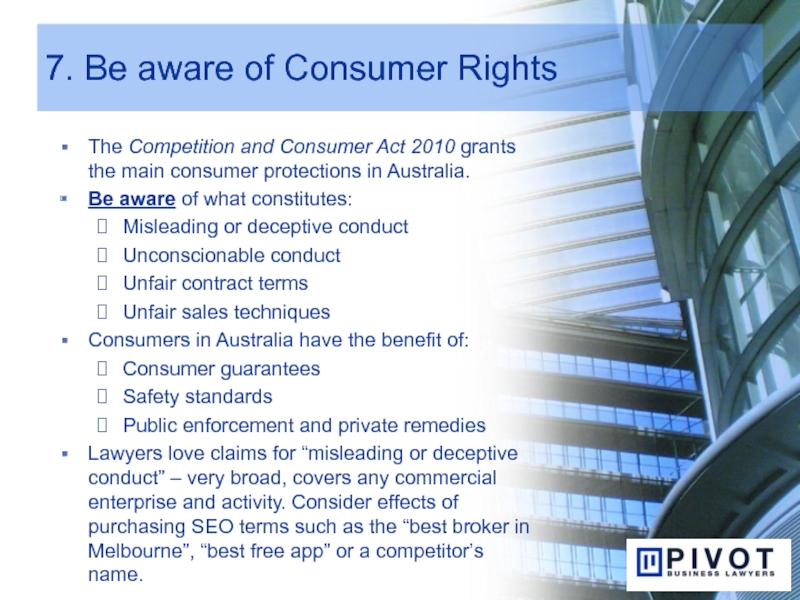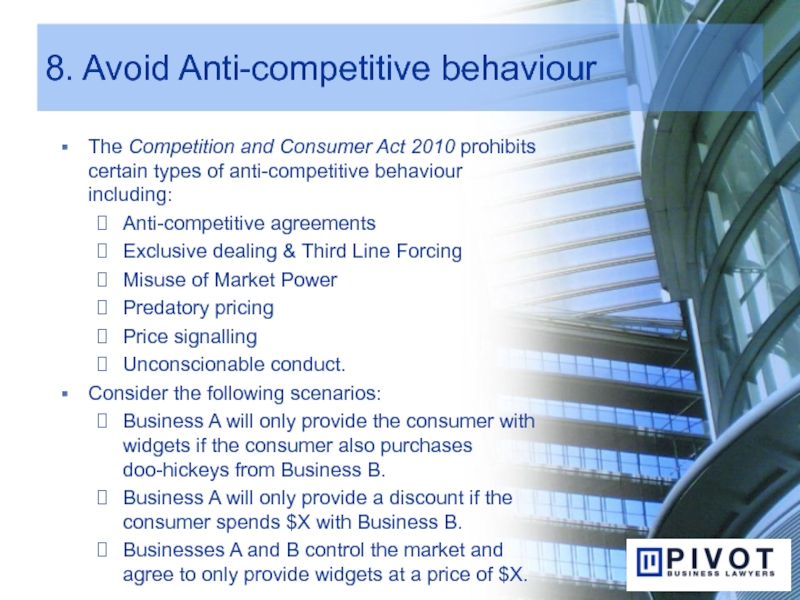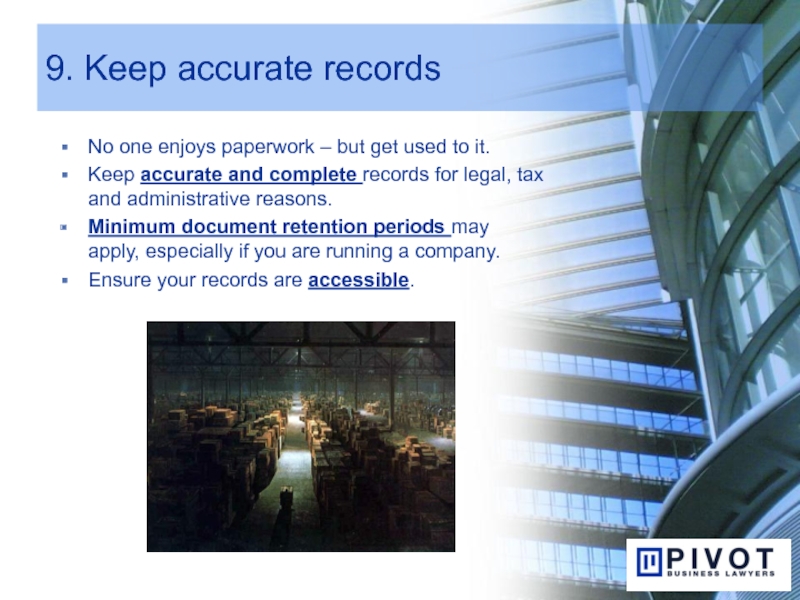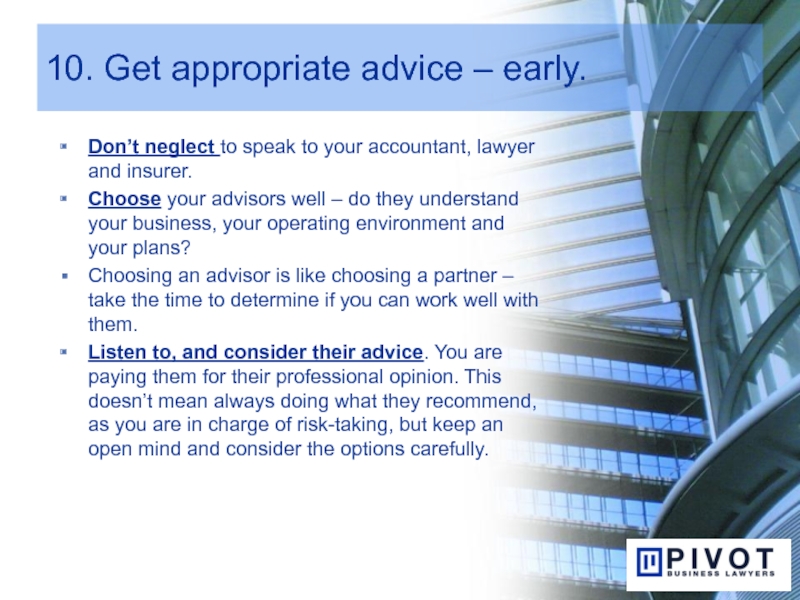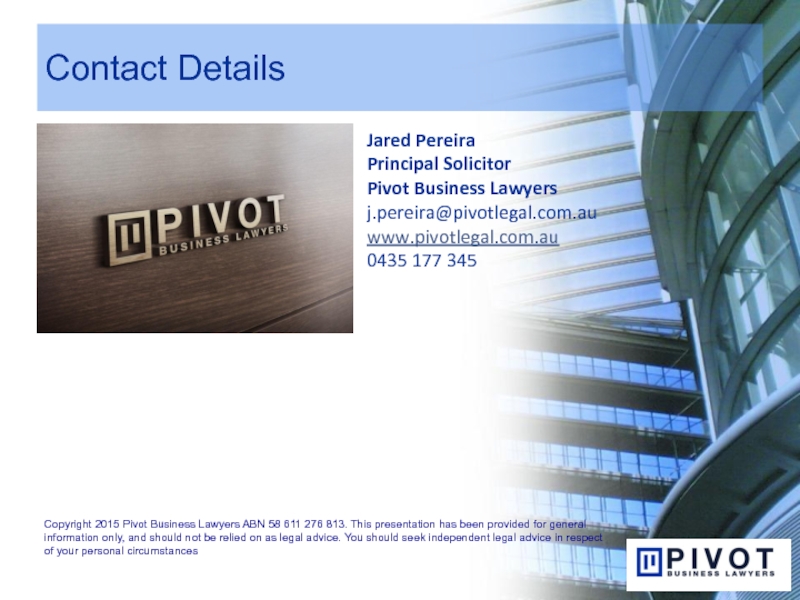- Главная
- Разное
- Дизайн
- Бизнес и предпринимательство
- Аналитика
- Образование
- Развлечения
- Красота и здоровье
- Финансы
- Государство
- Путешествия
- Спорт
- Недвижимость
- Армия
- Графика
- Культурология
- Еда и кулинария
- Лингвистика
- Английский язык
- Астрономия
- Алгебра
- Биология
- География
- Детские презентации
- Информатика
- История
- Литература
- Маркетинг
- Математика
- Медицина
- Менеджмент
- Музыка
- МХК
- Немецкий язык
- ОБЖ
- Обществознание
- Окружающий мир
- Педагогика
- Русский язык
- Технология
- Физика
- Философия
- Химия
- Шаблоны, картинки для презентаций
- Экология
- Экономика
- Юриспруденция
Solid Starts & Finishing WellLegal Tips for Start-Ups & Entrepreneurs презентация
Содержание
- 1. Solid Starts & Finishing WellLegal Tips for Start-Ups & Entrepreneurs
- 2. Legal Tips Decide on your set-up Plan
- 3. 1. What’s the set-up? Consider how you
- 4. 1. What’s the set-up? What’s your business
- 5. 2. What’s the exit strategy? Consider what
- 6. 3. Put everything in writing Always agree
- 7. 3. Put everything in writing Read the
- 8. 3. Put everything in writing Get your
- 9. 3. Put everything in writing Know your
- 10. 4. Spell out your terms and conditions
- 11. 5. Play by the rules – licensing
- 12. 6. Protect your Intellectual Property
- 13. 6. Protect your Intellectual Property
- 14. 7. Be aware of Consumer Rights
- 15. 8. Avoid Anti-competitive behaviour The
- 16. 9. Keep accurate records No
- 17. 10. Get appropriate advice – early.
- 18. Contact Details Jared Pereira Principal Solicitor Pivot
Слайд 2Legal Tips
Decide on your set-up
Plan your exit strategy
Document all agreements in
writing
Spell out your terms and conditions
Ensure you meet all licensing & regulatory requirements
Protect your intellectual property
Ensure you are aware of consumer rights
Don’t run foul of competition issues
Keep proper records
Get appropriate advice early
Spell out your terms and conditions
Ensure you meet all licensing & regulatory requirements
Protect your intellectual property
Ensure you are aware of consumer rights
Don’t run foul of competition issues
Keep proper records
Get appropriate advice early
Слайд 31. What’s the set-up?
Consider how you wish to structure your business.
This is your foundation. Common structures and their features include:
Company: Separate legal entity, limited liability, tax effects, filing requirements? Who are the shareholders – can they transfer shares? Who are the directors? Director’s guarantee? Reduced Control?
Partnership: Joint and several liability. Inexpensive. Who does what? Taxed in your hands. Risk to property in your name? Changes of ownership? Reduced Control?
Sole-proprietorship: Personal liability. Inexpensive. Difficult to raise capital? Taxed in your hands. Risk to property in your name? Control.
Trust: Can limit liability depending on trustee. Expensive. Control? Difficult to exit? Cannot distribute losses only profits.
Company: Separate legal entity, limited liability, tax effects, filing requirements? Who are the shareholders – can they transfer shares? Who are the directors? Director’s guarantee? Reduced Control?
Partnership: Joint and several liability. Inexpensive. Who does what? Taxed in your hands. Risk to property in your name? Changes of ownership? Reduced Control?
Sole-proprietorship: Personal liability. Inexpensive. Difficult to raise capital? Taxed in your hands. Risk to property in your name? Control.
Trust: Can limit liability depending on trustee. Expensive. Control? Difficult to exit? Cannot distribute losses only profits.
Слайд 41. What’s the set-up?
What’s your business name?
Check if it has been
registered
Is it misleading or deceptive? Passing off?
Doesn’t automatically give you a trademark
Doesn’t stop someone else from registering a similar name.
Doesn’t give you the exclusive right to use the name or a part of it
Doesn’t stop someone who has registered it as a trademark from using the name.
Doesn’t give you the exclusive right to a domain name.
Not necessarily the same as a trading name
Domain names, purchased SEO terms can be misleading or deceptive as well.
Is it misleading or deceptive? Passing off?
Doesn’t automatically give you a trademark
Doesn’t stop someone else from registering a similar name.
Doesn’t give you the exclusive right to use the name or a part of it
Doesn’t stop someone who has registered it as a trademark from using the name.
Doesn’t give you the exclusive right to a domain name.
Not necessarily the same as a trading name
Domain names, purchased SEO terms can be misleading or deceptive as well.
Слайд 52. What’s the exit strategy?
Consider what happens if you need to
exit for a variety of reasons:
Selling out
Reputational reasons
Change in direction
Irreconcilable differences
Changed character of partnership / shareholding
How do you resolve disputes?
Are you happy to work with a successor / family of a shareholder?
Documenting the shareholder/partnership agreement in painful detail in the beginning saves trauma at the end
Selling out
Reputational reasons
Change in direction
Irreconcilable differences
Changed character of partnership / shareholding
How do you resolve disputes?
Are you happy to work with a successor / family of a shareholder?
Documenting the shareholder/partnership agreement in painful detail in the beginning saves trauma at the end
Слайд 63. Put everything in writing
Always agree in writing. “Everything” means everything.
Trust is overrated. Faith and belief are for Sundays. Did you agree to the same thing as your partners / investors / suppliers / customers?
Don’t get a Toy Yoda when you expect a Toyota.
Don’t get a Toy Yoda when you expect a Toyota.
Слайд 73. Put everything in writing
Read the fine print. That’s usually where
the important clauses are – and it could cost you.
Consider Gamestation UK’s somewhat onerous terms:
Consider Gamestation UK’s somewhat onerous terms:
Слайд 83. Put everything in writing
Get your documents right. This assists in
scalability, accuracy, operational efficiency, billing and receiving payment, and is more professional.
Слайд 93. Put everything in writing
Know your contractual rights and obligations. If
you don’t know, seek advice.
Are there conditions precedent?
Are there representations and warranties?
Is there express or implied reliance on the acts of a third party to the contract?
What’s the difference (if any) between “best endeavours”, “best commercial endeavours” and “all reasonable endeavours”? What about “take all steps” and “take all reasonable steps”?
What are the service levels and standard of performance?
Is there a limit to liability?
Are there liquidated damages? Is it enforceable or a penalty?
What happens on termination?
Are there conditions precedent?
Are there representations and warranties?
Is there express or implied reliance on the acts of a third party to the contract?
What’s the difference (if any) between “best endeavours”, “best commercial endeavours” and “all reasonable endeavours”? What about “take all steps” and “take all reasonable steps”?
What are the service levels and standard of performance?
Is there a limit to liability?
Are there liquidated damages? Is it enforceable or a penalty?
What happens on termination?
Слайд 104. Spell out your terms and conditions
Define your terms of supply:
Are
your payment terms pre-payment / immediate / 30 days / 60 days or a combination?
What’s included in the supply?
How will you supply?
When is supply complete?
Deal at arm’s length.
Avoid personal guarantees where possible
Avoid warranties and representations where possible
Ensure you have the right non-disclosure agreements in place
Non-compete clauses
Confidentiality clauses
Who gets paid, when and how?
What’s included in the supply?
How will you supply?
When is supply complete?
Deal at arm’s length.
Avoid personal guarantees where possible
Avoid warranties and representations where possible
Ensure you have the right non-disclosure agreements in place
Non-compete clauses
Confidentiality clauses
Who gets paid, when and how?
Слайд 115. Play by the rules – licensing & regulations
Ensure you
can sell what you’re selling.
Do you have the appropriate qualifications and licenses?
Ensure you are selling correctly.
Are you dealing in personal data? (Privacy)
Are you creating software based on a non-commercial licence? (Licensing)
Are you working in a highly regulated area like credit, broking, financing, telecommunications, debt collection? (Regulatory issues)
Are you a franchisee or a franchisor? (Licensing, Contractual issues)
Are you selling a consumer product? (Consumer issues, safety issues)
Consider: Uber.
Do you have the appropriate qualifications and licenses?
Ensure you are selling correctly.
Are you dealing in personal data? (Privacy)
Are you creating software based on a non-commercial licence? (Licensing)
Are you working in a highly regulated area like credit, broking, financing, telecommunications, debt collection? (Regulatory issues)
Are you a franchisee or a franchisor? (Licensing, Contractual issues)
Are you selling a consumer product? (Consumer issues, safety issues)
Consider: Uber.
Слайд 126. Protect your Intellectual Property
There are four main types of intellectual
property rights of relevance to small & medium enterprises:
Copyright (Works including text, maps, databases, arrangements)
Trademarks (Images, sounds, smells)
Patents (Inventions)
Registered Designs (Designs that have a commercial or industrial application)
Generally, IP rights do not protect the idea. They protect the expression of the idea.
Copyright is automatic, but the other IP rights should be registered to ensure exclusivity.
Breach of IP rights can be expensive.
The same acts that breach IP rights may also be the subject of a claim for misleading or deceptive conduct under the Australian Consumer Law.
Copyright (Works including text, maps, databases, arrangements)
Trademarks (Images, sounds, smells)
Patents (Inventions)
Registered Designs (Designs that have a commercial or industrial application)
Generally, IP rights do not protect the idea. They protect the expression of the idea.
Copyright is automatic, but the other IP rights should be registered to ensure exclusivity.
Breach of IP rights can be expensive.
The same acts that breach IP rights may also be the subject of a claim for misleading or deceptive conduct under the Australian Consumer Law.
Слайд 136. Protect your Intellectual Property
Protect your IP (it forms part of
your business’s assets, and may be the main asset) via:
Registering / asserting your rights
Ensuring contracts preserve your IP rights
Non-disclosure / confidentiality agreements
Ensuring partnership / shareholder / employee contracts clearly state IP ownership: who owns what is brought into the business, and what is created within the business?
Use other people’s IP properly:
What licence do you have? What is “non-commercial use”? Do you want to have to credit ‘hothacka75’ for the use of code?
Shareware / Freeware / API standards?
Sharing on social media – e.g. Facebook auto-display of images in links
Hyperlinking vs Deep-Linking
Registering / asserting your rights
Ensuring contracts preserve your IP rights
Non-disclosure / confidentiality agreements
Ensuring partnership / shareholder / employee contracts clearly state IP ownership: who owns what is brought into the business, and what is created within the business?
Use other people’s IP properly:
What licence do you have? What is “non-commercial use”? Do you want to have to credit ‘hothacka75’ for the use of code?
Shareware / Freeware / API standards?
Sharing on social media – e.g. Facebook auto-display of images in links
Hyperlinking vs Deep-Linking
Слайд 147. Be aware of Consumer Rights
The Competition and Consumer Act 2010
grants the main consumer protections in Australia.
Be aware of what constitutes:
Misleading or deceptive conduct
Unconscionable conduct
Unfair contract terms
Unfair sales techniques
Consumers in Australia have the benefit of:
Consumer guarantees
Safety standards
Public enforcement and private remedies
Lawyers love claims for “misleading or deceptive conduct” – very broad, covers any commercial enterprise and activity. Consider effects of purchasing SEO terms such as the “best broker in Melbourne”, “best free app” or a competitor’s name.
Be aware of what constitutes:
Misleading or deceptive conduct
Unconscionable conduct
Unfair contract terms
Unfair sales techniques
Consumers in Australia have the benefit of:
Consumer guarantees
Safety standards
Public enforcement and private remedies
Lawyers love claims for “misleading or deceptive conduct” – very broad, covers any commercial enterprise and activity. Consider effects of purchasing SEO terms such as the “best broker in Melbourne”, “best free app” or a competitor’s name.
Слайд 158. Avoid Anti-competitive behaviour
The Competition and Consumer Act 2010 prohibits certain
types of anti-competitive behaviour including:
Anti-competitive agreements
Exclusive dealing & Third Line Forcing
Misuse of Market Power
Predatory pricing
Price signalling
Unconscionable conduct.
Consider the following scenarios:
Business A will only provide the consumer with widgets if the consumer also purchases doo-hickeys from Business B.
Business A will only provide a discount if the consumer spends $X with Business B.
Businesses A and B control the market and agree to only provide widgets at a price of $X.
Anti-competitive agreements
Exclusive dealing & Third Line Forcing
Misuse of Market Power
Predatory pricing
Price signalling
Unconscionable conduct.
Consider the following scenarios:
Business A will only provide the consumer with widgets if the consumer also purchases doo-hickeys from Business B.
Business A will only provide a discount if the consumer spends $X with Business B.
Businesses A and B control the market and agree to only provide widgets at a price of $X.
Слайд 169. Keep accurate records
No one enjoys paperwork – but get used
to it.
Keep accurate and complete records for legal, tax and administrative reasons.
Minimum document retention periods may apply, especially if you are running a company.
Ensure your records are accessible.
Keep accurate and complete records for legal, tax and administrative reasons.
Minimum document retention periods may apply, especially if you are running a company.
Ensure your records are accessible.
Слайд 1710. Get appropriate advice – early.
Don’t neglect to speak to your
accountant, lawyer and insurer.
Choose your advisors well – do they understand your business, your operating environment and your plans?
Choosing an advisor is like choosing a partner – take the time to determine if you can work well with them.
Listen to, and consider their advice. You are paying them for their professional opinion. This doesn’t mean always doing what they recommend, as you are in charge of risk-taking, but keep an open mind and consider the options carefully.
Choose your advisors well – do they understand your business, your operating environment and your plans?
Choosing an advisor is like choosing a partner – take the time to determine if you can work well with them.
Listen to, and consider their advice. You are paying them for their professional opinion. This doesn’t mean always doing what they recommend, as you are in charge of risk-taking, but keep an open mind and consider the options carefully.
Слайд 18Contact Details
Jared Pereira
Principal Solicitor
Pivot Business Lawyers
j.pereira@pivotlegal.com.au
www.pivotlegal.com.au
0435 177 345
Copyright 2015 Pivot Business
Lawyers ABN 58 611 276 813. This presentation has been provided for general information only, and should not be relied on as legal advice. You should seek independent legal advice in respect of your personal circumstances

